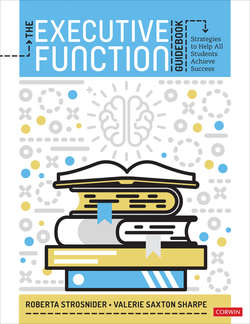Читать книгу The Executive Function Guidebook - Roberta Strosnider - Страница 11
На сайте Литреса книга снята с продажи.
CHAPTER 1 What You Need to Know Before Deciding to Implement Executive Function (EF) Skills Training and the 7-Step Model Reader Outcomes
Оглавление☑ You will be able to explain what executive functioning (EF) is and how students can benefit from EF skill training.
☑ You will be able to explain how Universal Design for Learning (UDL) and metacognition complement EF skill training.
☑ You will be able to identify the role of supportive technology in EF skill training.
☑ You will be able to describe the 7-Step Model and the Modified 7-Step Model.
☑ You will be able to determine how you might offer EF training in your setting.
As educators, the demands placed upon us today extend beyond the traditional mastery of content knowledge. Held to accountability standards for continual student progress, as measured in part by high-stakes testing, it is our responsibility to deliver instruction in a manner that facilitates learning for all students. Current inclusive practices have resulted in heterogeneous groupings of students with a variety of learning and behavioral needs within most classrooms.
Being held to high standards regarding student achievement and success is not new. In 1983, the National Commission on Excellence in Education produced a report entitled A Nation at Risk that communicated the strong need for major reforms in the educational process in the United States. It emphasized the need for better educational opportunities for all students (https://www2.ed.gov/pubs/NatAtRisk/risk.html). Running parallel to this cry for reform was a movement to grant inclusion to individuals with disabilities in all facets of society. As a result, legislative mandates such as the Individuals with Disabilities Education Act (IDEA, 2004), No Child Left Behind Act (NCLB, 2001) and Every Student Succeeds Act (ESSA, 2015) continued to raise the bar for educators and students. Even with accountability mandates and a focus on evidence-based practices, too many students today still experience failure or difficulty in school. In some cases, this is a result of deficits related to executive functioning, which plays a critical role in the planning, implementation, monitoring, and evaluation of adaptive behavior (Welsh, Pennington, Ozonoff, Rouse, & McCabe, 1990). The inclusion of strategies that address executive function deficits needs to become a part of our best practices repertoire.
